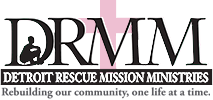Over time, the Detroit Rescue Mission Ministries (DRMM) has been subjected to attack for many reasons. First, because we believe in God and secondly, because of our success helping people in our community. The third reason is because we don’t ask people in our programs for anything in return, except that they become good citizens and productive members of the community. The fourth is that we have succeeded for over 100 years, as evidenced by the testimonies of those we have helped. We have seen that what works best for many people in a bad situation (whether they are homeless, addicted, in a violent domestic situation or engaged in criminal behavior) is to have something in their lives to look forward to that we call God, in addition to surrounding them with a very good support system that we call a church, without forcing anything on them.
DRMM, in its 100 years of service of helping people in the community, has provided food, shelter, housing, substance abuse treatment, health services, prevention and intervention programs for youth, permanent housing, job training, educational opportunities ranging from GED completion to college diplomas, résumé building, employment placement, summer camping, and on-the-job training.
We have helped men and women, children and youth, seniors and infants, people of all races and ages, literally from cradle to grave. Some have been only temporarily homeless due to circumstances while others have been chronically homeless. Among them have been military veterans, regular citizens, the mentally ill, substance abusers, alcoholics and prostitutes. All of them have been worthy of our best efforts.
DRMM is an organization of choice that never neglects anybody and does not turn anybody away because of race, religion, color, creed, gender, origin, weight, political beliefs or sexual preference. No matter what their situation is, DRMM has been there to address their needs and stands by them to help them become a productive citizen in our community.
We have grown over the years from being a small shelter and soup kitchen to becoming one of the largest social service organizations of its kind. We grew from helping maybe ten people a day in 1909 to helping almost 1,300 people a day in 2009. This does not even include hundreds of others who were helped by the distribution of food boxes, clothes and furniture.
Eventually, DRMM had to go in all directions to secure funds to be able to support the growing needs of the people who come to our doors. For this reason, the budget has grown from hundreds of dollars a year in 1909 to $18 million in 2009. In the beginning, we relied only on the generosity of certain individuals. Today we rely on the generosity of tens of thousands of people, as well as money allocated by our government for specific social services, which was made possible because of constitutional protection supporting freedom of speech and religion.
The most recent threat to the work we have been blessed to do has come to us from an organization by the name of Americans United for Separation of Church and State. There was a recent news release saying that because DRMM is a Christian organization, we should not be funded by the government.
Ignoring all the good DRMM has accomplished through our 100 years of existence, they have also ignored all the facts that we do not discriminate against anybody because of religion or other factors. We do not force religion on people or use government funds to purchase or pay for any religious activities. We are very proud of being a faith-based organization. As a matter of fact, we believe God is the secret to our success and is definitely the motivation for our service.
We are not dropping our faith for the Americans United for Separation of Church and State. We plan to continue for as long as possible to provide social services using government funds under the protection of the Constitution of the United States which grants equal rights to all citizens of this country.
DRMM has never and will never force religion on anybody. As a matter of fact, we don’t believe that you should. Jesus Christ spoke the truth, but left the decision as to whether to believe His claims to the individual. Religion must be an individual personal choice. DRMM’s role is to make the choice available to them and support them. We thank God who continues to bring our way faithful individual donors as well as corporations and foundations who allow us to use their money to teach people about God without tapping into any government funding.
My challenge today for people like the Americans United for Separation of Church and State is, “What have you done to help people? What have you done to protect them from their own wrongdoing? What solutions do you bring to the table to meet the needs of people in need? Are you just there to stop organizations with a proven success record of showing love and compassion and preserving the dignity and respect of others?”
Know this, we will continue to do our work, confident in our ability and understanding that the Constitution, laws and federal guidelines permit us to do so. Because we believe in God, we are loyal people and good stewards of all the money coming to our hands. We are accountable because God taught us to be so. You don’t have to worry about us. But we do worry about you. We worry about your intentions and goals and motivation.
But, by God’s grace we will be blessed to do what God wants us to do and, definitely, you will be in our prayers.




